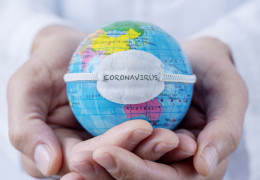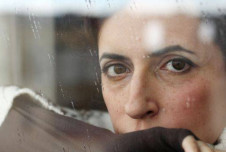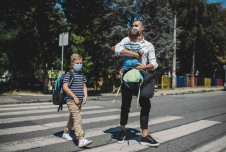“I’m ready for the pandemic to stop now, please.”

That’s what I texted my colleague Kira Newman the other day. What happened to trigger it?
Nothing new, really. My teenage son does have COVID-19, at this writing—thanks, Omicron wave—but that isn’t the problem, not exactly. Liko is young and vaccinated and the symptoms are passing quickly.
The problem is that I’ve been watching him get hit over and over again for almost two years. He’s 17 years old and he’s experienced too many disappointments, too much isolation, too much illness and death. I won’t bore you with our list of pandemic-time hardships, so you’ll have to trust me when I say it’s long. I often just don’t know how to help him, and the help I provide never seems like enough.
Meanwhile, my partner Angela is an emergency physician and it’s been Groundhog Day in the ER for far too long. Every shift she faces waves of unvaccinated, angry patients; stressful, hyper-vigilant safety protocols; impossible decisions; the never-ending chaos that comes with running out of space and supplies; and so much more. Angela is the toughest person I know but she’s a human being, like all doctors and nurses. She’s needed support from me every day of the pandemic, and every day, I fail her just a little more.
I’ve had my own, humbler role to play, for what it’s been worth. When the pandemic first arrived, we at Greater Good knew what we had to do: draw on all the research we’ve been covering for two decades to help our readers navigate uncertainty, anxiety, and depression. Later, we expanded coverage to more practical problems: How do you celebrate birthdays and other milestones in a pandemic? How can we convince more people to get vaccinated? What questions should we ask about COVID-19 research?
Millions of people read those articles, and I read the words, too, as I edited them. I applied many of the suggestions to my daily life. Self-compassion...well, I tried. Gratitude, you bet. Lotta social connections; even during shelter in place, we stayed in touch with friends and family. Walking in nature, sure, every week. Trying to help others in worse shape than me, done and done and DONE.
Now, it’s January 2022. And I’m done. I feel like I’ve been pushing my family uphill for an eternity. It breaks my heart every time I bring breakfast, lunch, and dinner on a tray to my son, who eats alone in his bedroom with COVID. It feels like the last straw. He and Angela are struggling, and so is the rest of my family, and so are almost all our friends, in their sundry ways.
Kira is a much more methodical user of the Greater Good Science Center’s happiness practices than I am, and her life is in many ways totally unlike mine (her boyfriend Fred and her cat Cora don’t seem to need too much care). And yet she confessed to me that she, too, had reached a point where better habits weren’t going to make her feel better. She understood me perfectly when I said I felt done.
Then she said something that struck me as very wise: “Maybe, we should just stop believing you can make this a good time. We think that we’re unhappy because we’re not doing enough of the things we’re supposed to be doing for our mental health—but maybe being happy in the 23rd month of a pandemic is just not realistic.”
For Kira—and for my son, in his quarantine—the problem is physical languishing and day-to-day sameness; for me and for Angela, it is constantly trying, and too often failing, to meet other people’s needs. During the pandemic, we have all faced different kinds of problems—and yet many of us are converging on the same conclusion: Perhaps it is time for us to give up, for now at least, our pursuit of happiness.
But what’s the alternative? When confronted with heartbreak and disease and death and isolation and money struggles and social injustice and political turmoil and so much more—when these things just keep coming, never letting us catch a breath, let alone allowing us to count our breaths—what can we do? What do you do when the promise of happiness—a promise we make to our readers every day—only seems cruel?
I sat with this question through the holidays and through the quarantine imposed by my son’s illness. I discussed it with my colleagues and with some of Greater Good’s circle of experts, as well as with friends and family. Some of these conversations were surprisingly hard; I did notice more than a little “toxic positivity,” which is the belief that no matter how dire a situation is, you should stay positive. If you’re not happy—well, then, you’re probably just not doing enough to be happy, goes this mindset. Try harder!
I have tried and now I think it’s time to try something different. If you have reached your limits and must now, with the Omicron surge, go beyond them, I’m talking to you. If you can’t get out of bed in the morning, if every day feels like crawling over broken glass—then I hope these thoughts can help you. I’m also talking, indirectly, to those who are close to someone at the end of their rope. I know how hard it is to help them, especially if they’re fighting the help you have to give.
What do you need, right now?
First, I think it can be healthy and right to feel bad. Most days, I’m at least a little angry or depressed or anxious. So is Angela. So is my son. We have been witness to each other’s rage and sadness, which I see in so many other people I know. I’ve decided that there’s nothing wrong with us; we’re not crazy. These are normal responses to a terrible situation.
But: What should you do, when you feel that way? From our panel of experts, the advice that resonated the most with me came from James Baraz, a founding teacher of Spirit Rock Meditation Center and author of the book Awakening Joy. This is what he wrote to me:
What’s needed, as I like to say, is learning to “change the channel.” When we get stuck in a tape loop of negative thinking, it’s hard to switch our train of thought.
When you’re depleted, often changing the channel will involve nourishing yourself and shifting your internal system in some way. You take a mental break, not out of avoidance or with any tinge of guilt, but rather with the intention to give yourself a loving, rejuvenating reboot. Rather than thinking of it as mere procrastination, skillfully refreshing yourself has been found to actually increase efficiency, mental clarity, and productivity.
I find that perhaps the important question to ask yourself is, “What do I need right now to be here for my life?” And then, instead of trying to figure out an answer, LISTEN inside for the wisdom that’s there if you quiet down enough to hear it.
He’s right: There always comes a moment, if only before we fall asleep, when we can shift the focus away from whatever is triggering the stress response over and over, to find once again the part of ourselves that keeps the beat of our lives through all its changes. This won’t happen naturally; it takes a deliberate act of will.
What I like about Baraz’s framing is that it asks you to meet yourself where you’re at, not where others would like you to be. What does that look like? In my case, I’m creating a private place where I can admit to myself, without shame, that I feel defeat, vindictiveness, resentment, or whatever other emotions I’ve had to keep in check for the sake of the people who need me.
This is a tricky problem, trying to see yourself when that self is being pulled in so many directions. Sometimes, I think, you’re just waiting for a moment of calm, when the world’s hold on you is weakest—and then trying to make the most of it. I know an ICU nurse in Reno who had been crying in his car in the parking lot before shifts and having chest pains at work. One afternoon as he woke after a string of brutal overnight shifts, his mind was calm enough so that he could ask himself Baraz’s question: What do I need, right now?
This led him to call in sick and go for a day-long hike. He hates lying and he called me in distress: “Did I do the right thing?” I told him that he did, and I meant it. He’s working in a system that’s rigged against his well-being in so many ways.
Even so, I think he felt weak. Like so many people who work in medicine, he feels a deep need to feel strong enough and competent enough to do whatever must be done. But when that’s your identity, what happens when you falter? What can you do, when you feel helpless to help people, when you feel like you’re failing them at every turn?
Can you forgive yourself?
Many people I talked to mentioned some variant of self-forgiveness as an essential tool of well-being in bad situations, and that makes sense to me, as well. Doctors and nurses suffer when they feel like they can’t help their patients—and when they need to do things like keep loved ones away in a patient’s final hours, they feel terrible.
When they get home, those of us who live with them feel like we can’t ever give them enough comfort, which widens that circle of failure and shame. For their part, teachers know that many children are slipping between the cracks created by the pandemic, but they might feel like they can’t do anything more about it. At some point, you need to draw boundaries, but that doesn’t mean you won’t hate yourself for doing so.
When you feel powerless to do the right thing, psychologists call this moral injury or moral distress, and it’s one of the factors that can drive burnout and post-traumatic stress disorder, terms that seem inadequate to describe what’s happening to people right now.
We often reject self-forgiveness (and its cousin, self-compassion) for the same reason we reject forgiveness of others: We don’t want to let anyone off the hook for perceived failures. The trouble with this way of thinking, in the midst of a pandemic, is that it fails to account for how little control we have in a crisis.
One doctor-friend, who had been struggling with anger at the unvaccinated, told me that learning about the concept of moral injury actually helped her to recalibrate her expectations of herself. “It gave a legitimate name and reason for why I was feeling what I was feeling,” she said. “I think that was when I gave myself permission to not carry the responsibility of fixing COVID.”
It’s a simple idea that’s worth trying to bear in mind: There are things you just cannot fix. School psychologist Rebecca Branstetter suggested regular “control audits” to me—surveying the problems of your life to see what you can control and what you can’t. “And if all else fails,” she added, “I just tell myself, ‘You are doing the best you can…in a global pandemic,’ and that helps me give myself grace.”
My colleague at the Greater Good Science Center, Emiliana Simon-Thomas, argues that we need to “soften the inclination to be a hero, honor that you can’t fix it, and, instead, persist in offering tender, supportive, magnanimous presence and generosity, when and where you can. Give, knowing you won’t be affirmed or recognized, and that the problem will most likely persist.”
How can you fight back?
Much of this comes down to a crisis of purpose—a goal you pursue that promises to make a difference for other people. In this pandemic, the exact nature of the crisis will vary from person to person.
Those who have been too isolated for too long can feel as though they’re drifting, perhaps because they lack the connections to nourish their purpose. Greater Good has published many articles about how helping others in the pandemic can make us feel better about ourselves and the world. That’s true, as far as it goes—and that might be what’s needed for people who have suffered from isolation, to get out of their own heads and serve others.
However, that’s terrible advice for people who have spent too much of the pandemic helping—who are burned out on taking care of children, parents, students, patients, and others. Helping people is good, yes, but not to a point where you can’t help yourself.
Which leads me to something that I believe can help us all get through the rest of this disaster: political activism. Understaffed and undersupplied emergency rooms and ICUs are the result of bad public policy decisions and bad priorities; so are insufficient mental health services and schools that don’t have the resources to help make up for profound learning losses.
Our anger and frustration—which we may too often turn on colleagues or family—is at least partially the result of economic and social structures that are designed to exploit our natural compassion and empathy. Even in the midst of the quotidian pandemic shuffle, there must be a place for fighting back against that exploitation.
Here, it’s not for me to say what public policies you should support or how you should participate in the process. My suggestion is more emotional in nature, and involves shifting anger and aggression away from those closest to us toward the forces that make it hard to take care of each other. Doing that won’t just (potentially) improve our relationships—over the long run, I hope, it’ll make the world a better place.
That is a tall order. But, whatever you can do in changing things, that needs to be enough. Not too long ago, I built my life around social justice and political change. Now, the best I can do is vote; march when I hear about a march, if I have the time; help shape the direction of the magazine I’m paid to edit; and write my little articles. I’ve tried to make peace with this change in life—to soften, as Emiliana suggests, my noble but misguided inclination to be the hero.
And I’m trying to let go of the idea that I can be happy. Kira is right: For many of us, happiness is not a realistic goal right now. You don’t need to chase after happiness or see unhappiness as a sign of failure. You don’t need to be grateful or mindful or even compassionate. You don’t need to be or do anything.
For me, as I write, the best I can do is put one foot in front of the other—that’s my purpose right now, to keep going. Most days, that looks like me once again making dinner for my beleaguered family, or sitting still with them as they once again reveal terrible feelings. I am indeed ready for the pandemic to stop now, please—and it will. Good or bad, nothing stays the same. When happiness once again becomes possible, we’ll be here.









Comments